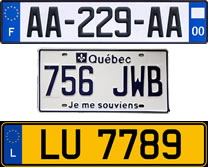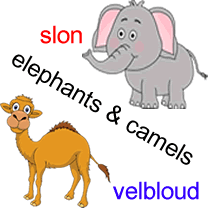
Here’s a recording in a mystery language.
Can you identify the language, and do you know where it’s spoken?

Here’s a recording in a mystery language.
Can you identify the language, and do you know where it’s spoken?

Yesterday I learnt that the French for a number plate / license plate / vehilce registration plate is une plaque d’immatriculation [source].
The word immatriculation means registration, and comes from the word immatriculer (to register), which comes from the Medieval Latin immatriculare (to join) [source]. This comes from the Latin mātrīcula (public register), a diminutive of mātrīx (uterus, womb, source, origin, list, register) [source].
Mātrīx comes from Latin māter (mother, woman, nurse, motherland), from the Proto-Italic *mātēr (mother), from Proto-Indo-European *méh₂tēr (mother), which is the root of words for mother in many languages [source].
The English word matrix comes from the Latin mātrīx, either directly, or via the Old French matrice (pregnant animal) [source].
I never know what connections I’ll find when I set off on an etymological adventure like this. Yesterday I found that matriculation and mātrīx were connected, which inspired me to write this, but I wouldn’t have guessed that mātrīx and māter were also connected.
An interesting Russian expression I learnt recently is меньше знаешь – лучше спишь (men’she znayesh’ – luchshe spish’), which means “the less you know, the better you sleep”, and is equivalent to the English expression ignorance is bliss.
Ignorance is bliss comes from Ode On A Distant Prospect Of Eton College, a 1742 poem by Thomas Gray, an Englsh poet, in which he wrote “where ignorance is bliss, ‘Tis folly to be wise.” [source]
While it might be true that you sleep better if you have less to worry about, I don’t agree with Thomas Gray about the value of ignorance and the folly of being wise.
Similar sayings include out of sight, out of mind, and what you don’t know can’t hurt you.
What about in other languages? Are there similar sayings?

Here’s a recording in a mystery language.
Can you identify the language, and do you know where it’s spoken?
When someone is talking in a way that doesn’t make sense to you, is using specialist jargon, is speaking a foreign language you don’t know, or is using made-up words, you might say they’re talking gibberish.
Other words for gibberish include gobbledygook, claptrap, jibber, jabber, jibber-jabber, folderol, twaddle, hogwash, bunkum, blabla, humbug, mumbo-jumbo, jargon, babble, double Dutch and nonsense [source].
Gibberish is possibly onomatopoeic in origin, imitating to the sound of chatter, or from the the Irish word gob (mouth) [source].
In French equivalents of gibberish include charabia, galimatias, amphigouri, blabla and foutaise. To talk gibberish is dire du charabia, baragouiner or bredouiller [source].
You can hear a bit of gobbledygook in the latest episode of the Radio Omniglot Podcast, which I recorded yesterday, and edited today. My friends and I sometimes talk in gobbledygook just for a laugh. Maybe I should add a page about it to Omniglot.
Do you know any other words of gibberish in English or other languages?

What do elephants and camels have in common?
Well, words for camel in Slavic languages like Czech and Russian possibly come from an Ancient Greek word meaning elephant.
In Czech the word for camel is velbloud [ˈvɛlblou̯t], which comes from the Proto-Slavic *velьb(l)ǫdъ / vъlьb(l)ǫdъ (camel), from the Gothic 𐌿𐌻𐌱𐌰𐌽𐌳𐌿𐍃 (ulbandus – camel), from the Latin elephantus (elephant), from the Ancient Greek ἐλέφας (eléphas – elephant) [source].
Words from camel in other Slavic languages come from the same root: верблюд (verbljúd) in Russian and Ukrainian, вярблюд (vjarbljúd) in Belarusian, wielbłąd in Polish, and so on [source].
These all come from the Gothic 𐌿𐌻𐌱𐌰𐌽𐌳𐌿𐍃 (ulbandus), but from there the etmological trial gets a bit hazy, as they quite often do. Traditionally this word is thought to derive from the Greek ἐλέφας, via the Latin elephantus.
Another theory is that the Gothic word comes from the Proto-Germanic *elpanduz (elephant, camel), which possibly comes from the Hittite word hu(wa)lpant (humpback), or from another ancient language of Anatolian such as Luwian [source].
The word for elephant in Czech (and also in Slovak, Serbian, Croatian and Slovenian) is slon [slon], which comes from the Proto-Slavic *slonъ (elephant) [source], which comes either from the Turkish aslan (lion), or from *sloniti (to lean against), relating to the medieval story of an elephant sleeping leaning on a tree [source].
So now we know where the name of the lion in The Lion, The Witch and The Wardrobe probably comes from.

Here’s a recording in a mystery language.
Can you identify the language, and do you know where it’s spoken?
An interesting word I heard the other day is tartle. It’s a Scots word that means “To hesitate, to be uncertain as in recognising a person or object; to boggle, “as a horse does”; to hesitate about clinching a bargain.” or “To recognise, esp. after some uncertainty, to discern”.
An example of how it is used is: “I tartled at him, I could not with certainty recognise him.”
The related adjective, tartlesome, means “disposed to start objections, captious*”.
*Captious [ˈkæpʃəs] = “apt to notice and make much of trivial faults or defects; faultfinding; difficult to please.” [source].
Source: Dictionary of the Scots Language / Dictionar o the Scots Leid.
I heard tartle on the Something Rhymes with Purple podcast, where it’s defined as “to hesitate when introducing someone because you’ve forgetten their name”.
To avoid tartling, I just don’t use people’s names, except when necessary. Although I find that if I repeat someone’s name several times after being introduced to them, I’m more likely to remember it.
Do you have any good ways to remember name, and to avoid tartling?
One of the Russian words I learnt this week is грабить [ˈɡrabʲɪtʲ], which sounds like ‘grab it’ and means to rob, burgle or pillage.
An example of how it’s used is: Нельзя же грабить банк в платье (You can’t rob a bank in a dress) – is this something that often comes up in Russian conversation? [source].
I wondered if this word is related to the English word grab, so decided to find out.
According to Wiktionary, грабить comes from the Proto-Slavic *gràbiti (to grab, seize). This comes either from the Proto-Balto-Slavic *grāˀb-, from Proto-Indo-European *gʰreb (to rake). Or from the Proto-Indo-European *gʰrebʰ- (to seize).
Grab comes from the Middle Dutch grabben (to grab), or from the Middle Low German grabben (to snap), from the Proto-Germanic *grab-, from Proto-Indo-European *gʰrebʰ-, which is one possible root of грабить, so they might be related [source].
Even if the two words are not related, their similar sound will help me remember the Russian one.

Here’s a recording in a mystery language.
Can you identify the language, and do you know where it’s spoken?